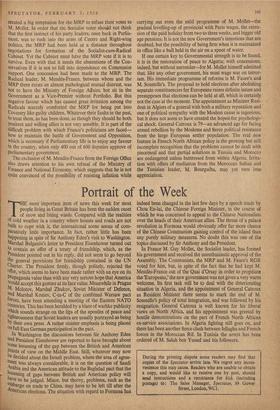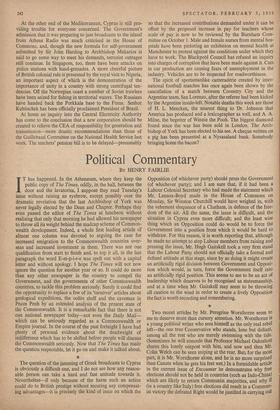Portrait of the Week
THE most important item of news this week for most people living in Great Britain has been the sudden onset of snow and biting winds. Compared with the realities of cold weather in a country where houses and roads are not built to cope with it, the international scene seems of com- Paratively little importance. In fact, rather little has been happening in spite of Sir Anthony Eden's visit to Washington. Marshal Bulganin's letter to President Eisenhower turned out to contain an offer of a treaty of friendship, which, as the President pointed out in his reply, did not seem to go beyond the general provisions for friendship contained in the UN Charter. The President firmly, though politely, rejected the offer, which seems to have been made rather with an eye on its Propaganda value than with any very serious hope that America Would accept this gesture at its face value. Meanwhile in Prague M. Molotov, Marshal Zhukov, Soviet Minister of Defence, and Marshal Koniev, C-in-C of the combined Warsaw pact forces, have been attending a meeting of the Eastern NATO Countries. This has been heralded by a blare of warlike publicity which sounds strange on the lips of the apostles of peace and righteousness that Soviet leaders are usually portrayed as being by their own press. A rather sinister emphasis is being placed On full East German participatiori in the pact. In Washington the discussions between Sir Anthony Eden and President Eisenhower are reported to have brought about some lessening of the gap between the British and American Points of view on the Middle East. Still, whatever may now be decided about the Israeli problem, where the area of agree- ment was always considerable, it is on the question of Saudi Arabia and the American attitude to the Baghdad pact that the lessening of gaps between British and American policy will Dave to be judged. Minor, but thorny, problems, such as the embargo on trade to China, may have to be left till after the American elections. The situation with regard to Formosa has indeed been changed in the last few days by a speech made by Chou En-tai, the Chinese Foreign Minister, in the course of which he was concerned to appeal to the Chinese Nationalists over the heads of their American allies. The threat of a palace revolution in Formosa would obviously offer far more chance of the Chinese Communists gaining control of the island than any purely military measures. No doubt this was one of the topics discussed by Sir Anthony and the President.
In France M. Guy Mollet, the Socialist leader, has formed his government and received the unenthusiastic approval of the Assembly. The Communists, the MRP and M. Faure's RGR voted for him, but, in spite of the fact that he had kept M. Mendes-France out of the Quai d'Orsay in order to propitiate the 'Europeans,' the new government was not given a very warm welcome. Its first task will be to deal with the deteriorating situation in Algeria, and the appointment of General Catroux as Resident Minister there seems to mark the end of M. Soustelle's policy of total integration, and was followed by his resignation. General Catroux is well known for his liberal views on North Africa, and his appointment was greeted by hostile demonstrations on the part of French North African ex-service associations. In Algeria fighting still goes on, and there has been another fierce clash between fellagha and French forces in the Moroccan Rif. In Tunisia the arrest has been ordered of M. Salah ben Yussef and his followers. At the other end of the Mediterranean, Cyprus is still pro- viding trouble for everyone concerned. The Government's admission that it was preparing to jam broadcasts to the island from Athens Radio was much criticised in the House of Commons, and, though the new formula for self-government submitted by Sir John Harding to Archbishop Makarios is said to go some way to meet his demands, terrorist outrages still continue. In Singapore, too, there have been attacks on police stations with hand-grenades. A more cheerful picture of British colonial rule is presented by the royal visit to Nigeria, an important aspect of which is the demonstration of the importance of unity in a country with strong centrifugal ten- dencies. Off the Norwegian coast a number of Soviet trawlers have been seized for fishing in territorial waters. The Russians have handed back the Porkkala base to the Finns. Senhor Kubitschek has been officially proclaimed President of Brazil.
At home an inquiry into the Central Electricity Authority has come to the conclusion that a new corporation should be created to relieve the CEA of responsibility for generation and transmission—more drastic recommendations than those of the Guillebaud Committee on the National Health Service last week. The teachers' pension bill is to be delayed—presumably so that the increased contributions demanded under it can be offset by the proposed increase in pay for teachers whose scale of pay is now to be reviewed by the Burnham Com- mittee on October 1. Male and female nurses from mental hos- pitals have been picketing an exhibition on mental health at Manchester to protest against the conditions under which they have to work. The Blackpool Council has refused an inquiry into charges of corruption that have been made against it. Cuts in car production are causing fears of unemployment in the industry. Vehicles are to be inspected for roadworthiness.
The spirit of sportsmanlike cameraddrie created by inter- national football matches has once again been shown by the cancellation of a match between Coventry City and the Argentine team, San Lorenzo, after the referee had been kicked by the Argentine inside-left. Notable deaths this week are those of H. L. Mencken, the nearest thing to Dr. Johnson that America has produced and a lexicographer as well, and A. A. Milne, the begetter of Winnie the Pooh. The biggest diamond found since the war has been sold in London. The Arch- bishop of York has been elected to his see. A cheque written on a pig has been presented at a Nysasaland bank. Somebody bringing home the bacon?



































 Previous page
Previous page